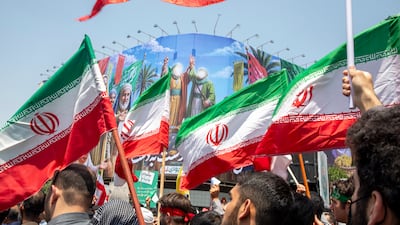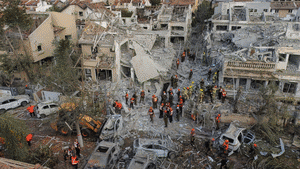The US hopes that talks with Tehran about its nuclear programme will continue, despite Israel's attacks on Iran that have called into question the merit of negotiations.
Following Friday's strikes, Iran said it was withdrawing from the sixth round of nuclear negotiations that were due to take place in Oman on Sunday with US Special Middle East Envoy Steve Witkoff.
The talks were supposed to forestall military action against Iran by forcing it to give up all uranium enrichment capabilities and abandon its drive to develop a nuclear weapon. For weeks, US President Donald Trump sounded optimistic that a deal could be achieved, while also threatening dire consequences for Iran if it did not reach an agreement.
Ultimately, Israel rendered those talks moot by launching a “pre-emptive” strike against Iran's military leaders and its nuclear sites.
Despite those actions, Mr Trump insisted Iran possibly has a “second chance” to come to the negotiating table.
“Iran must make a deal, before there is nothing left, and save what was once known as the Iranian empire. No more death, no more destruction, just do it, before it is too late,” he wrote in a post on Truth Social.
Israel began striking Iranian targets in the early hours of Friday and continued its attacks throughout the day. Iran later responded, unleashing dozens of missiles at Israel.
Israel's strikes were far more extensive than those it conducted against Iran last year, and underscored the country’s growing assertiveness, as well as its military and intelligence capabilities.
Mossad released video that it claims shows its agents deployed in Iran.
Iranian President Masoud Pezeshkian said Iran will make Israel regret its attacks.
“The Iranian nation and the country's officials will not remain silent in the face of this crime, and the legitimate and powerful response of the Islamic Republic of Iran will make the enemy regret its foolish act,” Mr Pezeshkian said in a video statement aired on state TV.
Mr Trump later told Reuters that the US still has nuclear talks planned with Iran on Sunday but that he is not sure if they will take place.
“I tried to save Iran humiliation and death,” Mr Trump said, adding he is not concerned about a regional war breaking out as a result of Israel's strikes.
A US official told The National that Washington is planning for talks to continue.
“We still intend to have talks,” the official said, without specifying when these might occur.
Israel said it struck around 100 targets across Iranian cities on Friday morning, using 200 planes. The attacks caused oil prices to surge and investors to buy safe havens such as gold and US Treasuries.
When asked by NBC News why he thinks Iran would still want to hold talks, Mr Trump said Iranian representatives were calling him to suggest they still wanted a deal.
Alex Vatanka, a senior fellow at the Middle East Institute, said Iran might continue talks, provided the country's supreme leader, Ayatollah Ali Khamenei, is willing to do so.
He “has to make a decision” about how much he wants to respond, Mr Vatanka said.
“If he wants to step down, the obvious thing to do is to go back to the negotiations, to look for a way to either give up enrichment, temporarily or for good, or find a compromise somewhere between,” Mr Vatanka said.
“If you can avoid humiliating Ali Khamenei, if you think … he's going to stay in power, then don't humiliate him. Find a way for him to find it easy to come back and negotiate”.
Who is Mohammed Al Halbousi?
The new speaker of Iraq’s parliament Mohammed Al Halbousi is the youngest person ever to serve in the role.
The 37-year-old was born in Al Garmah in Anbar and studied civil engineering in Baghdad before going into business. His development company Al Hadeed undertook reconstruction contracts rebuilding parts of Fallujah’s infrastructure.
He entered parliament in 2014 and served as a member of the human rights and finance committees until 2017. In August last year he was appointed governor of Anbar, a role in which he has struggled to secure funding to provide services in the war-damaged province and to secure the withdrawal of Shia militias. He relinquished the post when he was sworn in as a member of parliament on September 3.
He is a member of the Al Hal Sunni-based political party and the Sunni-led Coalition of Iraqi Forces, which is Iraq’s largest Sunni alliance with 37 seats from the May 12 election.
He maintains good relations with former Prime Minister Nouri Al Maliki’s State of Law Coaliton, Hadi Al Amiri’s Badr Organisation and Iranian officials.
Key facilities
- Olympic-size swimming pool with a split bulkhead for multi-use configurations, including water polo and 50m/25m training lanes
- Premier League-standard football pitch
- 400m Olympic running track
- NBA-spec basketball court with auditorium
- 600-seat auditorium
- Spaces for historical and cultural exploration
- An elevated football field that doubles as a helipad
- Specialist robotics and science laboratories
- AR and VR-enabled learning centres
- Disruption Lab and Research Centre for developing entrepreneurial skills
COMPANY%20PROFILE
%3Cp%3E%3Cstrong%3ECompany%3A%3C%2Fstrong%3E%20Eco%20Way%3Cbr%3E%3Cstrong%3EStarted%3A%3C%2Fstrong%3E%20December%202023%3Cbr%3E%3Cstrong%3EFounder%3A%3C%2Fstrong%3E%20Ivan%20Kroshnyi%3Cbr%3E%3Cstrong%3EBased%3A%3C%2Fstrong%3E%20Dubai%2C%20UAE%3Cbr%3E%3Cstrong%3EIndustry%3A%3C%2Fstrong%3E%20Electric%20vehicles%3Cbr%3E%3Cstrong%3EInvestors%3A%3C%2Fstrong%3E%20Bootstrapped%20with%20undisclosed%20funding.%20Looking%20to%20raise%20funds%20from%20outside%3Cbr%3E%3C%2Fp%3E%0A
UAE currency: the story behind the money in your pockets
Israel Palestine on Swedish TV 1958-1989
Director: Goran Hugo Olsson
Rating: 5/5
Keep it fun and engaging
Stuart Ritchie, director of wealth advice at AES International, says children cannot learn something overnight, so it helps to have a fun routine that keeps them engaged and interested.
“I explain to my daughter that the money I draw from an ATM or the money on my bank card doesn’t just magically appear – it’s money I have earned from my job. I show her how this works by giving her little chores around the house so she can earn pocket money,” says Mr Ritchie.
His daughter is allowed to spend half of her pocket money, while the other half goes into a bank account. When this money hits a certain milestone, Mr Ritchie rewards his daughter with a small lump sum.
He also recommends books that teach the importance of money management for children, such as The Squirrel Manifesto by Ric Edelman and Jean Edelman.
%3Cp%3E%3Cstrong%3EDirector%3A%3C%2Fstrong%3E%20Nag%20Ashwin%3C%2Fp%3E%0A%3Cp%3E%3Cstrong%3EStarring%3A%20%3C%2Fstrong%3EPrabhas%2C%20Saswata%20Chatterjee%2C%20Deepika%20Padukone%2C%20Amitabh%20Bachchan%2C%20Shobhana%3C%2Fp%3E%0A%3Cp%3E%3Cstrong%3ERating%3A%20%3C%2Fstrong%3E%E2%98%85%E2%98%85%E2%98%85%E2%98%85%3C%2Fp%3E%0A
More from Neighbourhood Watch:
DUBAI%20BLING%3A%20EPISODE%201
%3Cp%3E%3Cstrong%3ECreator%3A%20%3C%2Fstrong%3ENetflix%3C%2Fp%3E%0A%3Cp%3E%3Cstrong%3EStars%3A%20%3C%2Fstrong%3EKris%20Fade%2C%20Ebraheem%20Al%20Samadi%2C%20Zeina%20Khoury%3C%2Fp%3E%0A%3Cp%3E%3Cstrong%3ERating%3A%3C%2Fstrong%3E%202%2F5%3C%2Fp%3E%0A
FIXTURES
All times UAE ( 4 GMT)
Friday
Saint-Etienne v Montpellier (10.45pm)
Saturday
Monaco v Caen (7pm)
Amiens v Bordeaux (10pm)
Angers v Toulouse (10pm)
Metz v Dijon (10pm)
Nantes v Guingamp (10pm)
Rennes v Lille (10pm)
Sunday
Nice v Strasbourg (5pm)
Troyes v Lyon (7pm)
Marseille v Paris Saint-Germain (11pm)
GROUP RESULTS
Group A
Results
Ireland beat UAE by 226 runs
West Indies beat Netherlands by 54 runs
Group B
Results
Zimbabwe tied with Scotland
Nepal beat Hong Kong by five wickets





